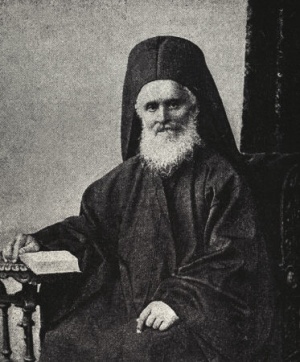Anthimus VII (Tsatsos) of Constantinople
His All-Holiness Anthimus VII (Tsatsos) of Constantinople was Patriarch of Constantinople during two years of the last decade of the nineteenth century, 1895 and 1896. He was a theologian and orator who was most remembered as a critic of the Roman Pope Leo XIII's encyclical of June 1894.
Life
Little is known of his life. Patr. Anthimus was born about the year 1835, possibly in Ioannina, Greece.
After Pope Leo XIII's encyclical Praeclara Gratulationis Publicae was promulgated on June 20, 1894, Patriarch Anthimus issued a critique refuting the proposed grounds for the reunion of the Orthodox and Roman churches. While he cited the traditional Eastern arguments against Western corruption of early Christian doctrine, Patriarch Anthimus added new charges that were occasioned by the teachings formulated by the Roman Church during the nineteenth century. Patriarch Anthimus accused the Roman Church of introducing new approaches to Christian faith, such as, the pronouncement by Pope Pius IX in 1854 of the dogma of the Immaculate Conception of the Virgin Mary wherein she was exempt from original sin, and the decree of the Vatican Council of 1869–70 on papal infallibility.
Patriarch Anthimus reposed during December 1913 after he was succeeded by Constantine V as patriarch and had retired to Halki.
| Anthimus VII (Tsatsos) of Constantinople
| ||
|---|---|---|
| Preceded by: ? |
Metropolitan of Paramythia 1869-1877 |
Succeeded by: ?
|
| Preceded by: ? |
Metropolitan of Aenos (Thrace) 1877-1888 |
Succeeded by: ?
|
| Preceded by: ? |
Metropolitan of Anchialos 1888 |
Succeeded by: ?
|
| Preceded by: Gregorios (1893) |
Metropolitan of Korytsa (Korca) 1893-1894 |
Succeeded by: Chrysanthus (1894-1895)
|
| Preceded by: ? |
Metropolitan of Leros and Kalymnos 1894-1895 |
Succeeded by: ?
|
| Preceded by: Neophytus VIII |
Patriarch of Constantinople 1895-1896 |
Succeeded by: Constantine V (Valiadis) |
Sources
- Britannica: Anthimus VII Tsatsos.
- Patriarch Anthimus VII of Constantinople. Wikipedia.
- (Greek)
Πατριάρχης Άνθιμος Ζ΄. Greek Wikipedia.
External link
Categories > People > Clergy > Bishops
Categories > People > Clergy > Bishops
Categories > People > Clergy > Bishops > Bishops by century > 19th-century bishops
Categories > People > Clergy > Bishops > Bishops by city > Bishops of Korca
Categories > People > Clergy > Bishops > Bishops by city > Bishops of Paramythia
Categories > People > Clergy > Bishops > Bishops by city > Patriarchs of Constantinople
